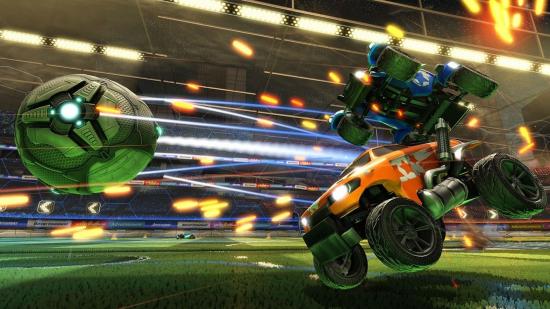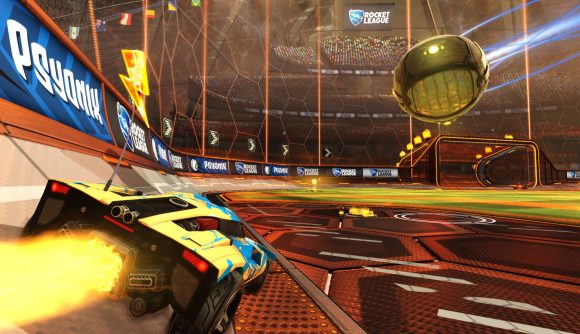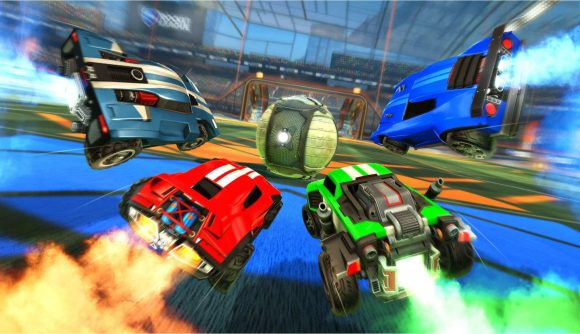Between PlayStation Plus Premium, Xbox Game Pass, and free Epic Games Store giveaways, it’s hard to remember a world where gamers had to stump up cash for every game they played. But back in 2015, this was still largely the case. While the free-to-play market was beginning to take off, the majority of mainstream console and PC games still required an up-front purchase to play. That is until Rocket League came along.
PlayStation Plus was in its infancy when Psyonix’s quirky vehicular sports game landed on the service. Developed as a follow-up to the failed PS3 project Supersonic Acrobatic Rocket-Powered Battle-Cars, Rocket League was designed to be nothing more than raucous fun, albeit with a vital competitive element.
No fanfare accompanied the launch, but it didn’t take long for gamers and the press to realise that something special had just happened. The game’s concept was almost comically simple – football with cars – and in a new console generation with few huge releases, gamers were willing to give it a punt. With the barrier to entry low, gamers began to download the game in their thousands and with it being multiplayer-based, getting their friends to download it too.
The press also heaped praise on Rocket League, recognising its polished gameplay, addictive unlock system, thumping soundtrack, and vibrant visuals. Initially launching on PS4 and PC only, it wasn’t long before ports for Linux, Xbox One, and Nintendo Switch were on the way. Playable across a variety of platforms, Rocket League was also one of the first major games to embrace cross-play, allowing players to go head-to-head across all manner of platforms (although Sony didn’t allow cross-platform play with their system until 2019).
Taking off
Over time, Psyonix supported Rocket League with regular patches and content updates, in an effort to keep the games’ chaotic fun balanced and fresh. Starting with some fun match modifiers like low gravity mode and cubed balls, Rocket League’s content updates gradually grew to add themed events, new game modes, and even whole new sports. Modes resembling ice hockey and basketball were added to the delight of fans, along with a ‘Rumble’ mode that added new power-ups to existing maps.
Recognising the game’s popularity, several cross-media franchises partnered with Psyonix for in-game collaborations. Partners included the likes of The Fast and Furious, Rick and Morty, Jurassic World, the NBA, Stranger Things, and many more.
Free flight
In September 2020, Psyonix fully embraced a new business model, making Rocket League officially free-to-play. While the game had been available for subscription services like PS Plus and Game Pass, this marked the first time that players on any platform could play Rocket League without any kind of third-party subscription.
To assist with the transition, Psyonix added cross-platform progression, making players’ cosmetic items, accolades, and rewards available across any platform they choose to play on. Players who had previously purchased the game were rewarded with ‘Legacy’ status, and got some bonus items in their inventory.
Naturally, the shift to free-to-play attracted an even larger audience to Rocket League, seeing player numbers increase rapidly. Two years on from this significant transition and Rocket League has never been stronger. Who knows what the future will hold for this staple title, but it’s a safe bet that Psyonix will continue to support it with new content and updates long into the future.
Leagues ahead
Due to the competitive nature of Rocket League, it only made sense for an esports scene to grow around the game. Seeing its popularity on streaming platforms like Twitch, Psyonix announced the Rocket League Championship Series in March 2016, with a $55,000 prize pool up for grabs.
Following the success of this tournament, Rocket League esports picked up steam, with several other competitive events springing up at gaming conventions and community events. Organisations like ESL and Major League Gaming quickly threw their support behind the scene, organising events both in and out of the US – it was even included at the Commonwealth Games in 2022. Now, Rocket League boasts a thriving esports community around the world.
And with Rocket League going free, the esports scene continues to grow. With this new influx of players, there’s never been a better time to get involved. If you want to compete at the highest levels of Rocket League, why not try the TRN Rocket League stat tracker available via Overwolf? This handy tool allows you to see which areas of your gameplay need improvement and how you stack up against the competition.
Using this app, you can check all of your Rocket League stats to see which areas of your gameplay need the most improvement. While you’re there you can also compare your performance to the top pros, with constantly updated performance leaderboards. It’s just one of many useful tools enabled by the Overwolf platform, that allows you access to mods and add-ons to your favourite games. Download Overwolf today to see its full range of gaming tools and apps.



